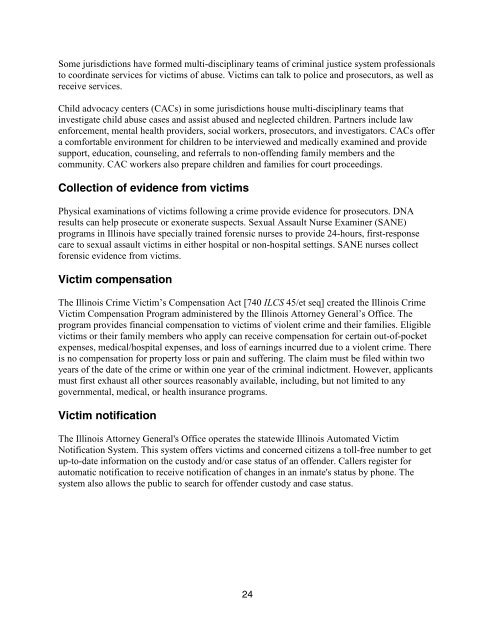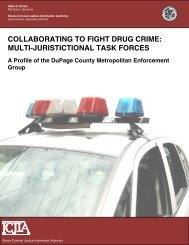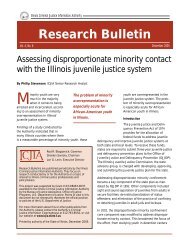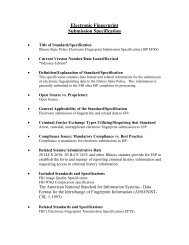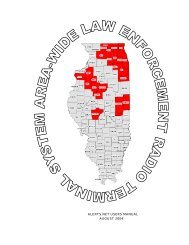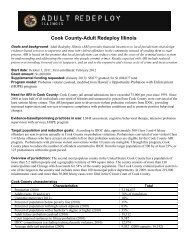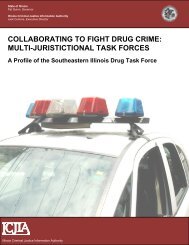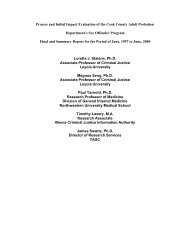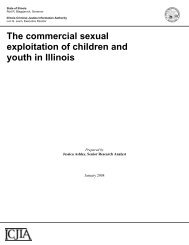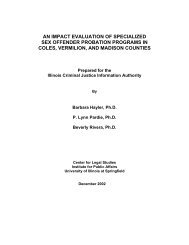policies and procedures of the illinois criminal justice system
policies and procedures of the illinois criminal justice system
policies and procedures of the illinois criminal justice system
You also want an ePaper? Increase the reach of your titles
YUMPU automatically turns print PDFs into web optimized ePapers that Google loves.
Some jurisdictions have formed multi-disciplinary teams <strong>of</strong> <strong>criminal</strong> <strong>justice</strong> <strong>system</strong> pr<strong>of</strong>essionals<br />
to coordinate services for victims <strong>of</strong> abuse. Victims can talk to police <strong>and</strong> prosecutors, as well as<br />
receive services.<br />
Child advocacy centers (CACs) in some jurisdictions house multi-disciplinary teams that<br />
investigate child abuse cases <strong>and</strong> assist abused <strong>and</strong> neglected children. Partners include law<br />
enforcement, mental health providers, social workers, prosecutors, <strong>and</strong> investigators. CACs <strong>of</strong>fer<br />
a comfortable environment for children to be interviewed <strong>and</strong> medically examined <strong>and</strong> provide<br />
support, education, counseling, <strong>and</strong> referrals to non-<strong>of</strong>fending family members <strong>and</strong> <strong>the</strong><br />
community. CAC workers also prepare children <strong>and</strong> families for court proceedings.<br />
Collection <strong>of</strong> evidence from victims<br />
Physical examinations <strong>of</strong> victims following a crime provide evidence for prosecutors. DNA<br />
results can help prosecute or exonerate suspects. Sexual Assault Nurse Examiner (SANE)<br />
programs in Illinois have specially trained forensic nurses to provide 24-hours, first-response<br />
care to sexual assault victims in ei<strong>the</strong>r hospital or non-hospital settings. SANE nurses collect<br />
forensic evidence from victims.<br />
Victim compensation<br />
The Illinois Crime Victim’s Compensation Act [740 ILCS 45/et seq] created <strong>the</strong> Illinois Crime<br />
Victim Compensation Program administered by <strong>the</strong> Illinois Attorney General’s Office. The<br />
program provides financial compensation to victims <strong>of</strong> violent crime <strong>and</strong> <strong>the</strong>ir families. Eligible<br />
victims or <strong>the</strong>ir family members who apply can receive compensation for certain out-<strong>of</strong>-pocket<br />
expenses, medical/hospital expenses, <strong>and</strong> loss <strong>of</strong> earnings incurred due to a violent crime. There<br />
is no compensation for property loss or pain <strong>and</strong> suffering. The claim must be filed within two<br />
years <strong>of</strong> <strong>the</strong> date <strong>of</strong> <strong>the</strong> crime or within one year <strong>of</strong> <strong>the</strong> <strong>criminal</strong> indictment. However, applicants<br />
must first exhaust all o<strong>the</strong>r sources reasonably available, including, but not limited to any<br />
governmental, medical, or health insurance programs.<br />
Victim notification<br />
The Illinois Attorney General's Office operates <strong>the</strong> statewide Illinois Automated Victim<br />
Notification System. This <strong>system</strong> <strong>of</strong>fers victims <strong>and</strong> concerned citizens a toll-free number to get<br />
up-to-date information on <strong>the</strong> custody <strong>and</strong>/or case status <strong>of</strong> an <strong>of</strong>fender. Callers register for<br />
automatic notification to receive notification <strong>of</strong> changes in an inmate's status by phone. The<br />
<strong>system</strong> also allows <strong>the</strong> public to search for <strong>of</strong>fender custody <strong>and</strong> case status.<br />
24


